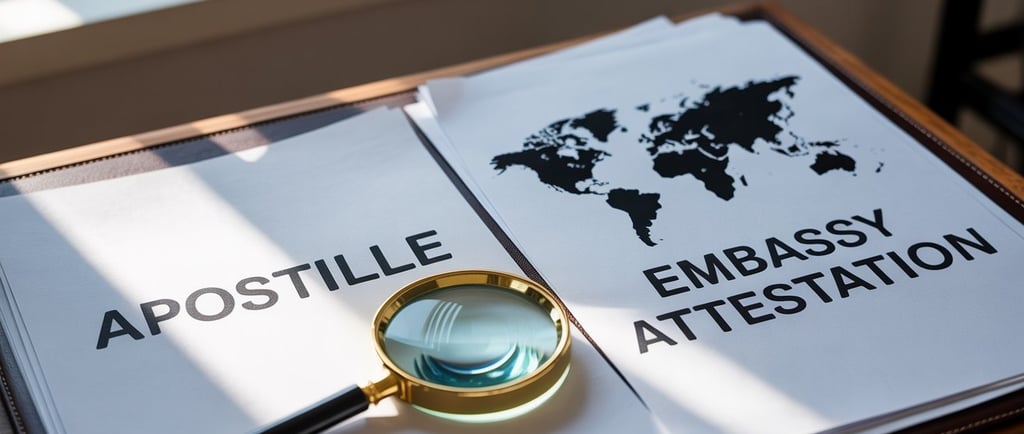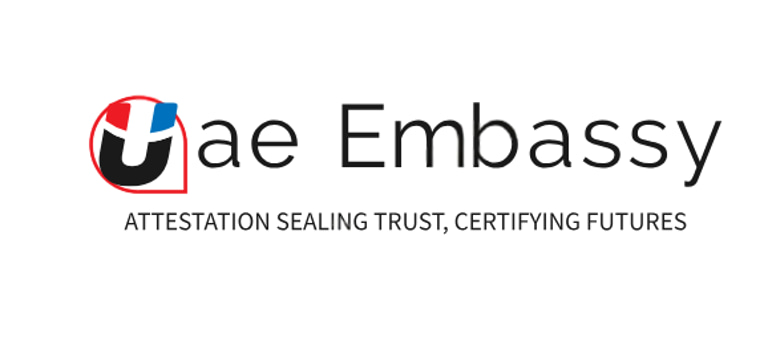Apostille vs Embassy Attestation: Key Differences
Discover the essential differences between apostille and embassy attestation. Learn about the attestation process and how these certifications affect your documents for use in international settings.
6/15/20255 min read


Introduction to Apostille and Embassy Attestation
The processes of apostille and embassy attestation play a critical role in the realm of international legal affairs. Both are methods of verifying the authenticity of documents intended for use in foreign jurisdictions, yet they operate under different frameworks and serve distinct purposes. Understanding these differences is essential for individuals or entities engaged in cross-border transactions, education, or legal processes.
An apostille is a certification that authenticates a document for use in a country that is a signatory to the Hague Convention of 1961. This process streamlines the validation of documents by eliminating the need for additional verification by foreign consulates. Typically issued by designated authorities in the originating country, such as the Secretary of State or a Notary Public, an apostille indicates that the document has been validated and is genuine. Commonly apostilled documents include birth certificates, marriage licenses, and academic diplomas, mainly employed in international scenarios like expatriation, study abroad programs, and international adoptions.
On the other hand, embassy attestation involves the verification of documents by the embassy or consulate of the destination country. This process is necessary when dealing with countries that are not a part of the Hague Convention or when specific documents require endorsement from the respective embassy before being recognized abroad. Embassy attestation often requires multiple steps, including initial verification by local authorities, ensuring compliance with the destination country's legal requisites. Document types typically subjected to embassy attestation can include business contracts, powers of attorney, and commercial agreements.
Understanding the respective roles of apostille and embassy attestation is paramount. Both processes serve to confirm the legality and authenticity of documents, enabling individuals and businesses to navigate international borders with confidence. As globalization continues to foster cross-border interactions, a nuanced understanding of these processes becomes necessary for effective international operations.
The Apostille Process: What You Need to Know
The apostille process serves as an important method for authenticating documents intended for international use. Originating from the Hague Convention of 1961, which aims to simplify the procedure of document verification between participating countries, an apostille is crucial for both individuals and businesses. To obtain an apostille, one must adhere to several defined steps, including understanding the specific requirements that vary from one jurisdiction to another.
Initially, individuals need to identify the type of document requiring an apostille. Common documents include birth certificates, marriage licenses, educational diplomas, and corporate records. Once identified, the document must be notarized, if not already. This preliminary step establishes the legitimacy of the document's origin. Following notarization, the next step involves submitting the document to the designated authority responsible for issuing apostilles in the respective country, typically the Secretary of State or a similar government office.
The fees associated with obtaining an apostille can fluctuate based on location and the nature of the document. Generally, costs may range from $5 to $50 per document, sometimes with additional service fees if expedited processing is required. Therefore, it is prudent to check with the local authority for precise details relating to pricing and processing times.
Moreover, it is essential to recognize the legal framework surrounding apostilles, as they confer validity to documents across borders, thereby facilitating international transactions. In various scenarios, such as applying for a job overseas, enrolling in educational institutions abroad, or conducting business in foreign markets, an apostille is often mandated. Understanding this process allows individuals and businesses to navigate the complexities of international document authenticity with confidence.
Embassy Attestation: A Comprehensive Overview
Embassy attestation is a critical process that ensures the authenticity of documents for various legal and administrative purposes beyond the borders of one's home country. It is often required for individuals who are planning to travel, work, or study abroad, as well as for those who need to present documents in foreign jurisdictions. This procedure typically involves the verification and validation of documents by the respective embassy or consulate.
To initiate the embassy attestation process, one must first gather the necessary documents that require validation. These often include birth certificates, marriage certificates, academic degrees, and employment letters. After compilation, the individual must submit the documents to the embassy or consulate corresponding to the country where the documents will be utilized. This can often be done by the individual or through authorized representatives, such as agencies or legal professionals.
The reasons for seeking embassy attestation are manifold. Common scenarios include applying for a work visa, residence permits, or educational opportunities in a foreign country. Additionally, embassy attestation may be necessary in legal disputes or when executing agreements that require international recognition. Understanding the specific requirements of the destination country is crucial, as this can vary significantly based on bilateral agreements and regulations.
Timeframes for embassy attestation vary depending on the embassy's workload and the complexity of the documents involved. Typically, the process can take anywhere from a few days to several weeks. Cost is another variable to consider, as embassy fees can differ based on the type of document and the level of service requested. Individuals are advised to consult the embassy's website or contact them directly for detailed information regarding fees and processing times to ensure a smooth experience throughout the attestation process.
Comparative Analysis: Apostille vs. Embassy Attestation
Understanding the distinctions between apostille and embassy attestation is crucial for individuals and businesses navigating international document verification processes. Both methods serve to authenticate documents, yet they differ significantly in terms of procedures, applications, legal recognition, and international acceptance.
To begin with, an apostille is a simplified certification process recognized by the Hague Convention of 1961. It is primarily used for documents that are to be utilized in countries that are signatories to this treaty. The apostille process typically involves obtaining a certificate from a designated authority in the originating country, which confirms the authenticity of the signature and the capacity of the signer. This makes apostille a straightforward option for quick international recognition.
Conversely, embassy attestation involves a more complex procedure that may vary significantly depending on the country. This method is often required for countries that are not a part of the Hague Convention. In most cases, the document must first be authenticated by the home country’s foreign ministry before being presented to the relevant embassy for further verification. This process can be more time-consuming and may involve additional fees compared to the apostille.
The legal recognition of apostilled documents is generally wide-reaching within the participating states. However, when it comes to embassy attestation, its acceptance can vary greatly, often dependent on bilateral agreements between countries. For example, a document attested by an embassy may be required for legal proceedings or other formalities in countries like India or the Gulf nations, where strict regulations prevail.
In scenarios where individuals or organizations need to validate documents for use in multiple jurisdictions, choosing the right method is pivotal. Apostille may expedite matters in Hague Convention countries, while embassy attestation may be indispensable for compliance in non-signatory regions. Understanding these variations ensures that the proper steps are taken to fulfill specific legal requirements, thus enabling smoother international transactions.
